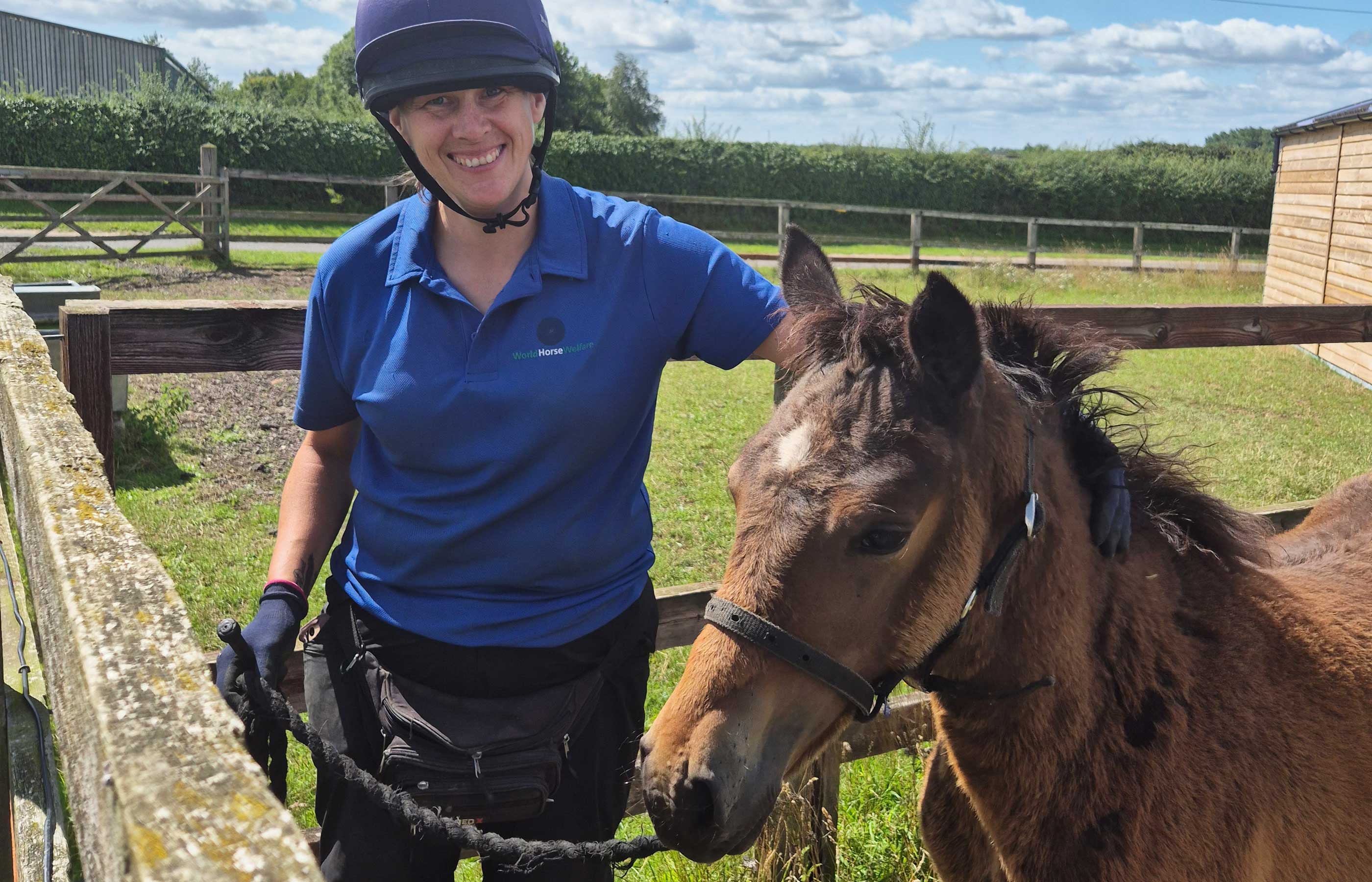The importance of foals having good experiences from birth
Foals born in our rescue and rehoming centres will receive expert, patient handling from day one – we caught up with yard supervisor Lorraine to hear more.
Posted on 04/09/2025

When 13.2hh mare Amy came into our care as part of a group known as the Trafficked 20, the team quickly discovered that she was pregnant. Her foal, named Joy by supporters, was born on 9th May and, along with all the other foals born at our rescue and rehoming centres, has experienced kind, expert handling from day one. Horses learn all the time, through every interaction with their handlers, so it’s vital that their training is both compassionate and consistent from the very start.
Every horse and pony in our centres is allocated to a specific groom, and Joy is cared for by Hall Farm yard supervisor Lorraine, who explains how foals are handled by our teams.
It’s so important for foals to have good experiences from the start, so we begin with lots of scratches, making friends with them and establishing that being around people is a positive thing. I like to introduce them to a headcollar early on too – we don’t lead from the headcollar when they’re that young, but getting them used to having a headcollar on and off is really helpful.
To begin teaching them to lead, we start with a lead rope wrapped around their neck and an arm behind their hindquarters, just getting them used to being guided around the farm. We’ll have them following their mum at that point, to help give them the idea of steering and that light pressure means stop.
We introduce them to the idea of having their legs and feet handled as soon as possible too, making sure to keep it a positive experience. There are lots of scratches involved! It’s essential that they learn how to pick their feet up early, so that they can be seen by our farrier. Prompt treatment from the farrier can make a huge difference if they’re born with less than ideal conformation, so foals must be happy with that.

At World Horse Welfare, we take a whole horse approach to rehabilitating the equines who come into our care, so all our specialists, including the vet, farrier, dentist, and physiotherapist, come in on a Tuesday. This means each horse or pony – or foal, in Joy’s case! – can be thoroughly assessed and have a bespoke rehabilitation plan created for them. Being walked and trotted up is an important part of this process and Joy had her first trot up for the specialists this week. I was really proud of her as she took it all in her stride and trotted up for them like she’d been doing it forever!
So far Joy’s feet haven’t needed any special care, but some of her friends, who were born around the same time, have just had specialist treatment from the farrier. Wurly needed to have her heel lowered on one foot, as we could see it was getting too upright, and Almond needed to have shoes with special extensions put on. This illustrates why it’s so crucial that we work with foals to make sure they’re comfortable having their legs and feet handled, as these early interventions can make a huge difference for their future soundness.
Once our foals are weaned, we then start progressing their handling further so that they’ll eventually be ready for rehoming as happy, confident youngsters. An important part of this process is turning them out in a small herd with some slightly older ponies – this helps them to learn vital social skills, which will set them up well for integrating in their new homes in the future.
You can find out more about how horses learn on our ‘Training: how do horses learn?’ page.
Topics
Related Blog Posts

Plan for an emergency when you’re not around – help us to help your horse
Deputy Chief Field Officer Jon Phipps has top tips for owners on making plans just in case your horse injures themselves when you’re not there.

How to help a needle-shy horse overcome their fear
Grooms Amy and Emily explain how they work with horses who are nervous with needles before a visit from the vet.
Recommended News Articles

Equine Grass Sickness: Exciting times ahead for this difficult and devastating disease of horses
The Moredun Foundation together with other organisations has produced a comprehensive new booklet on Equine Grass Sickness.

Team effort to help obese ponies face a fitter future
Four ponies arrived at Belwade Farm Rescue and Rehoming Centre last year dangerously obese and in need of months of expert care.

International Coalition for Working Equids workshop provides practical training
The workshop provided practical training on welfare assessments for working equids in Lesotho
Enjoy reading stories like this?
Join over 65,000 other horse lovers and sign up for our email newsletter

Join over 65,000 other horse lovers and sign up for our email newsletter
Sign me up now